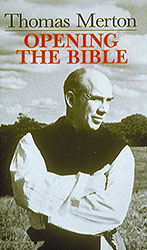
"The monk was soon at work on an introductory essay, entitled 'Opening the Bible', for an edition of the Bible to be published by Time-Life. For some reason the project fell through in 1967. But by September of that year Merton had produced an outline, and then by Advent a draft (heavily corrected with inserts and additions in hand), of 'Opening the Bible'. The manuscript is now in the possession of the Thomas Merton Studies Center of Bellarmine College, Louisville, Kentucky.
"It is apparent that Merton approached this writing with some trepidation, saying, 'I sincerely doubt my capacity to write anything worthwhile on the Bible. I am not a pro.'
"Despite these misgivings, a reading of the essay shows it to be an excellent example of the author's mature theological reflections--and his sense of humor. Merton is quick to point out that the Bible, 'a dangerous book' for which 'all blurbs are impossible,' can outrage, affront, perplex, or even bore its readers. And, he observes, some readers of the word of God find it easier to involve themselves in television commercials than in the Bible.
"And what is this 'word of God?' It is not an artificial system of thou shall or thou shalt not which demands blind acceptance. Rather, it is a word of liberating and transforming power. The basis of this power is the Bible's ability to answer the question 'What is this book?' with another: 'Who is this that reads it?'
"The message of the Bible is bound up with determining the true identity of its reader, a process which includes identifying God and entering into a reciprocal relationship with him.
"If we cease questioning the Bible, and aren't questioned by it, Merton warns, then perhaps our reading of it is no longer serious. This questioning stance of the Bible makes it possible for even the unbeliever to discover new aspects of its message. But the Bible demands the reader's personal involvement. Because such involvement lays one open to unforseen conclusions, our tendency is to avoid the arguments which lie within its pages altogether, particularly when we have predetermined what the Bible will say to us!
"Merton builds on this foundation by interweaving the Bible's witness to the power it contains with the effect it has had on people who read it 'outside the official framework of belief.' He cites the works of the latter, including the Italian cinematographer Pasolini, psychoanalyst Erich Fromm, and novelist William Faulkner, as examples of serious responses to the Bible's message.
"This essay was written in an urgent day: the one in which we live is no less fraught with spiritual and temporal dangers. Even now, Thomas Merton urges us to reject looking to the Bible for 'sure-fire methods for individual rescue from the world.' Instead, we must read it with discernment to respond decisively to the challenges of an unpredictable age." (From the Introduction by Robert E. Stone, II, Ann Arbor, Michigan, October, 1985)